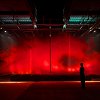If you don't have air conditioning, fans are the next best thing, right?
Not necessarily, according to new warnings from Interior Health.
In fact, the health authority is raising the alarm that if the indoor air temperature in your house hits 35C or higher, having a fan (whether it's a table, floor or ceiling model) blow more hot air on yourself actually causes your core body temperature to increase.
This new messaging is important right now as the Okanagan and Thompson are under a heat warning with forecasted highs today through Thursday at 35C to 37C.

We've certainly experienced hotter in the Okanagan and Thompson with the 47C heat dome of 2021.
However, the heat dome saw 619 die in BC -- mostly elderly and medically compromised people in the Lower Mainland who didn't have air conditioning.
Since, the province has been diligent in issuing extreme heat warnings and ways for people to deal with it.
“It’s important for people to understand that fans don’t actually cool down air, they only circulate or move it," said Interior Health medical health officer Dr. Sue Pollock.
"While a fan can bring some comfort on warm days, it isn’t a primary source of cooling and people need to find other ways to cool down in the heat.”
Thus, while fans may create a sense of coolness, they do not meaningfully lower core body temperature, especially for older people or other susceptible individuals, such as those with pre-existing conditions of the heart and-or lungs.

Interior Health calls indoor temperatures that reach 31C or more indoors at 'life-threateningly hot,' especially for the elderly and those with pre-existing health conditions.
That's when you have to get such people to a cool, shady outdoor space or move them to stay with a friend or family that has air conditioning.
When the outdoor air temperature is cooler than your indoor air temperature, as it is at night, a fan in or near a window is useful to blow cooler air from outside into the room.
Do not use a fan to bring outdoor air inside when the outside temperature is similar or higher than your indoor temperature.
Interior Health is also busting some myths about putting a big bowl of ice cubes in front of a fan or spraying water on your skin or wearing damp clothing while standing, sitting or lying in front of a fan.
While the elaborate set up may make you feel cooler temporarily, it will not meaningfully reduce your core temperature.
If you don't have air conditioning there are ways to beat the heat.
A cool shower or bath, even a footbath, can help, as can cool damp towels applied to the skin.
Close the curtains and blinds or seek refuge in the cooler basement.
Drink plenty of water and exercise early in the morning or after sunset.
FortisBC has some electricity-saving heatwave tips.
Cool only the rooms you're using with air conditioning, be it central air or an in-window unit.
Combining air conditioners with fans is a good way to maximize cooling power.
Setting your air conditioning system's thermostat two degrees higher than usual and using a fan can reduce cooling costs by 14%.
A cooling system thermostat setting between 25C and 27C will ensure you're still comfortable, but not chilly, and save energy.
















